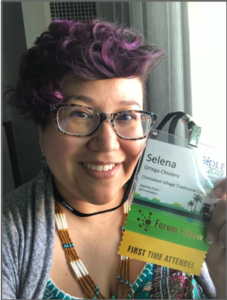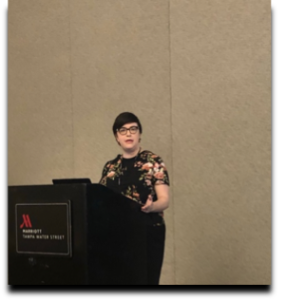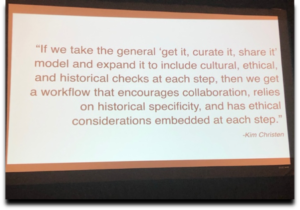T his post was written by Selena Ortega-Chiolero, who received an ARL + DLF Fellowship to attend this year’s DLF Forum.
his post was written by Selena Ortega-Chiolero, who received an ARL + DLF Fellowship to attend this year’s DLF Forum.
Selena is currently a member of the Chickaloon Village Traditional Council (CVTC) staff where she is assisting the Tribe in establishing a formal Tribal Collections and Archives that will house the history and culture of the Ahtna Dené of Chickaloon Native Village in Southcentral Alaska. Selena has worked with an array of museums, galleries and non-profit organizations throughout California and Alaska. Her broad industry experience includes museum administration, development, curatorial, collections, exhibitions and programs. She holds degrees in both Art History and Asian Studies from California State University, Sacramento, and is currently completing the Museum Studies indigenous certification program through the Institute of American Indian Arts in Santa Fe, New Mexico. Selena has been a part of the museum community in Alaska for the past nine years and is currently serving as the Board Secretary and Advocacy Task Force Leader for Museums Alaska, Alaska’s statewide museum association. When Selena is away from her desk, she enjoys beading, learning new languages, reading and travelling with her husband, Richard, and their French Bulldog, Crash.
Stranger in Not Such a Strange Land
In the museum world, 2019 has seen the industry recognize a need to shift in, not only how museums tell their stories but in how their staff and visitors relate to their collections. Conversations have focused on topics of access, inclusivity, equity and diversity. As a Tribal museum collections steward, these ideas are not new and radical, but rather a result of an increased understanding that museums are fundamentally at the core, educational institutions with a responsibility to share truths and provide a platform for communities to connect. In an effort to expand my own understanding of how our collections can serve our community, I decided to change things up in my ongoing professional training by taking the path less travelled and attending a new conference, one that was not under the museum industry umbrella. This is how I found myself attending the 2019 Digital Library Federation Forum held in Tampa, Florida.
I must admit, upon first impression I felt like a stranger in a strange land, privy to conversations I knew nothing about that incorporated specific vernacular and acronyms attuned to digital libraries such as Omeka, OCR and JIRA. Many of the attendees represented large institutions, mostly from university libraries with substantial funding and staff which was slightly intimidating for an attendee like myself, a Museum Specialist representing a small Ahtna Athabascan Tribe in Alaska. However, my nerves and concerns were cast aside once I heard Dr. Marisa Duarte’s opening plenary speech, “Beautiful Data: Justice, Code, and Architectures of the Sublime.”
Dr. Duarte impressed upon us that by understanding the relationship between data and justice we can begin to understand the relationship between digital libraries as institutions for change. She predicts that in years to come the digital archive and library will serve as an integral component in peoples’ “right to know.” It is in this increase of knowing among marginalized, oppressed and indigenous people that we will be able to understand the colonial processes and histories that have and continue to undermine indigenous self-determination and sovereignty. In supporting the “right to know” libraries and archives can serve as a catalyst for change by breaking down indigenous barriers.
I found it comforting that libraries, like museums, are beginning to understand that they can be painful sites for indigenous peoples as they are tied to the colonization process. In contrast, they can also be proponents of positive informative change. Throughout the Forum, several presenters echoed Dr. Duarte’s “right to know” call to arms. In a Digital Humanities + Decolonization session, William Fenton from the Library Company of Philadelphia presented projects from their Redrawing History initiative that seeks to gain indigenous perspectives on Colonial America. In a Copyrights session, Perry Collins from the University of Florida presented on her work in developing ethics literacy for open collections and suggested that we begin to question not just the how in digital sharing but the should we, as well.


Perry Collins presenting on ethics and copyright
Although I initially began my 2019 DLF Forum experience as a stranger maneuvering through unfamiliar waters, I discovered that the waters were not far off from the museum landscapes I have roamed for many years. In fact, digital libraries have more in common with museums then I initially thought. They, like museums, are responsible for selecting what and how they share their digital materials. Libraries are becoming curators in the sense that they are designing how their collections are presented to their users by the choices they make in their database lexicon, narrative, and record links. A responsibility that can either impact a few or many. Similarly, to museums, they are at that pivotal moment where the choices they make in regards to access and sharing will shape how and what people learn. Being confronted with these similar challenges has me convinced that both libraries and museums can learn much from each other in how they choose to overcome these obstacles. I am grateful to have had the opportunity to see collections and archives from a differing perspective. I am now more the wiser for it and foresee a future where I continue to stray from the usual professional training path so that I may broaden my outlook, expand my professional network and improve my skill set as a museum collections steward. Tsin’aen (thank you), DLF, for showing me there is more out there for me to learn.
